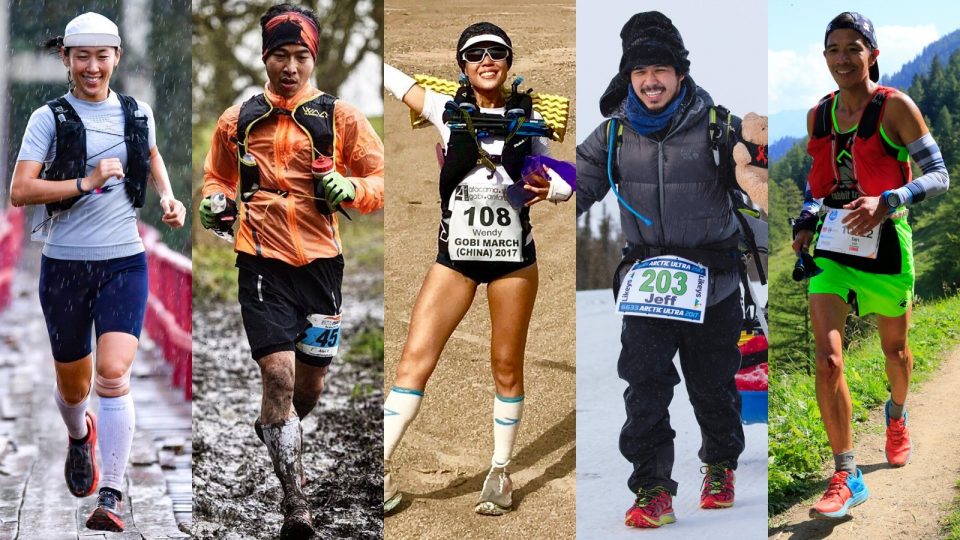What’s the farthest you have ever run? Many people would think a full marathon is already their limit. However, there are a bunch of runners that love to challenge their limits and take running to a whole new level by going beyond the traditional 42.195km. We called this group of runners—ultra runners.
Most long distance running or ultra marathons are done on the trails, so without further or ado, let’s dive in to understand more about the difference between ultra running and trail running.
After that, we have 10 elites of ultra running to share their long distance running stories with us, so you can discover the beauty of ultra marathon and how awe-inspiring these ultra runners are.
What is ultra running?
Ultra running is a sport of long distance running, also known as ultra marathon or as we say ultra running.
The distance of ultra running is anything over 42.195 kilometres. The shortest distance known to be an ultra is 50 kilometres or 31.07 miles. Other normal ranges are 50 miles, 100 miles, 100 kilometres or longer, and a series of events that last for specified time intervals such as 6 hours, 12 hours, 24 hours, 48 hours, and even up to several days.
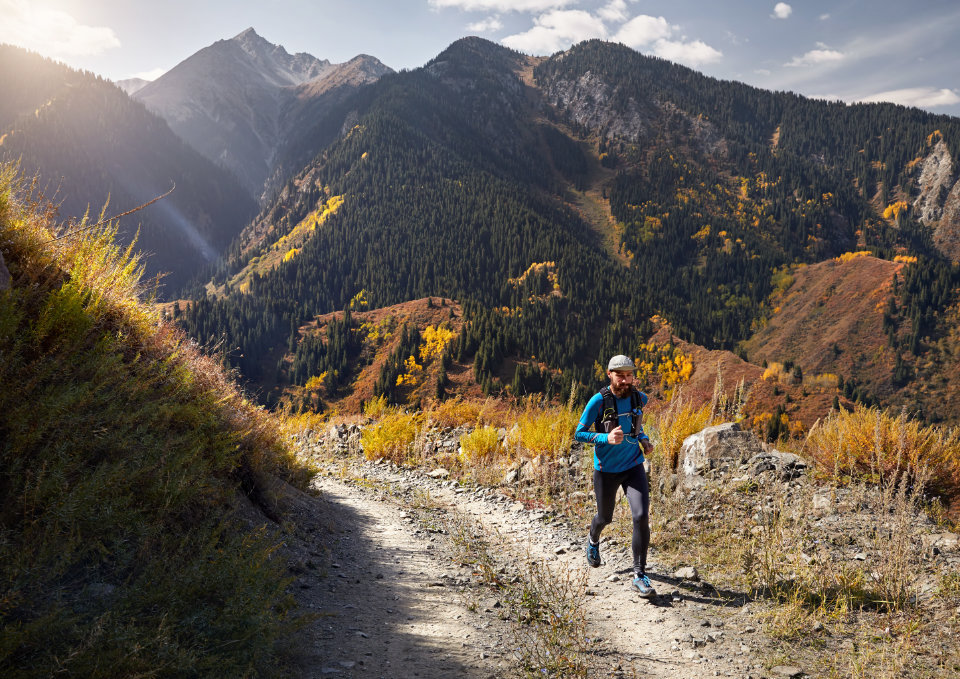
Road running vs Trail running
Pace matters in trail running compared to road running
The difference between road running and trail running is that road running normally based on how many runners hit their prescribed paces. Runners hit a certain pace for a certain distance, and they can determine whether their run was successful, or a failure.
On the other side, trail running pace’s are almost irrelevant. It’s important to know that when you are running trails, you are going to face great challenges. Many of which you will never face or rarely encounter when you are on the roads.
These challenges include, but are not limited to, lung-burning ascents, quad-killing descents, altitudes, and debris-ridden and difficult terrains (such as single-track trails or trails with tree roots and loose stones).
In the same distance, road running is faster than trail running
Road runners and trail runners do not have to compare their timing because both running styles are different. Why it is different? Due to the terrain, elevation gain or loss, and altitude as this will affect the running pace.
The necessities of gear in trail running than road running
If you are planning to go for an ultra trail running, you will find the necessitates of gear is useful during your trail running. You will realise the gears you need to prepare are a hydration vest to store your water and food, poles to help you traverse mountains, or even a helmet to help you safely traverse the most dangerous parts of your journey.
Compared to road running, you will just need the basic gear, which is an outfit, shoes and a watch, that’s all.
How to train for ultra run?
You might be thinking that you have to undergo insane trainings for an ultra marathon. We would recommend you not to rush into long distance running if you are new to ultra running, but follow a step-by-step plan to train for an ultra run.
Getting started
Give yourself to train for at least 3 months. Do a research on the course to identify the level of technical difficulty, hills, altitude, and weather. Or how is the trail or track like? Will it be a narrow trail with tree roots and rocks?
Is it a typically hot and humid or dry climate? Are you running on sand, dirt, rocks or grass? The more you know the better you can tailor your training to weave in similar terrain and optimally prepare your body and mind for the race day.
Gradually increase your distance
The training requires you to increase the volume of the distance slowly week-to-week and measured in time. An average beginner marathon-training program varies weekly from 15 to 45 miles per week, with a weekly range of 50 to 60 miles enabling most runners to reach the first 50.
Increase your mileage for three weeks, and recover during a fourth week by tapering your mileage down into the same range as week one.
Assuming you have been running a marathon before, slowly add 10 to 15 percent of the total weekly volume by increasing the length of every run if possible.
The long run
You could be running between 7 and 15 hours on the day of the race in your first 50. Long runs should be performed once a week or every 10 days to build up your endurance, depending on your history of running and your ability to recover.
Try to work your way and extend your run to around 30 miles or 48 kilometres. It is perfectly fine to walk during your ultra running or ultra trail running, because you will most likely walk to take a rest and get back on track afterwards.
The basic ultra marathon training plan might not suit or apply to everyone, as everybody has a different body and physical fitness. Generally, this is a good starting point for everyone.
Hear straight from the elite ultramarathoners
After some tips for running an ultra marathon, we are thrilled to speak to some of the most talented and elite ultra runners about their long distance running experiences. Most importantly, they had shared some good tips on their training plan.
If you are looking for motivation or some long distance running tips to boost up your ultra running journey. Well, you have to continue reading.
1. Ultra Runner: Wendy Yee
Bio: 44 year-old Singaporean entrepreneur, Dance and Fitness Coach
Wendy Yee is an ultra runner since 2016. Wendy loves coaching and being around people but she also loves to have her time alone with the nature.
Dancing, coaching and as an entrepreneur allows Wendy to express her creativity and to help people and that is important to her. She started ultra trail running at the age 41 and have since fallen in love with this sport.
Currently, Wendy is teaching Brazilian Zouk dancing in Montpellier, France.
The greatest accomplishment is to truly discover and understand the connection and relationship with nature and myself.
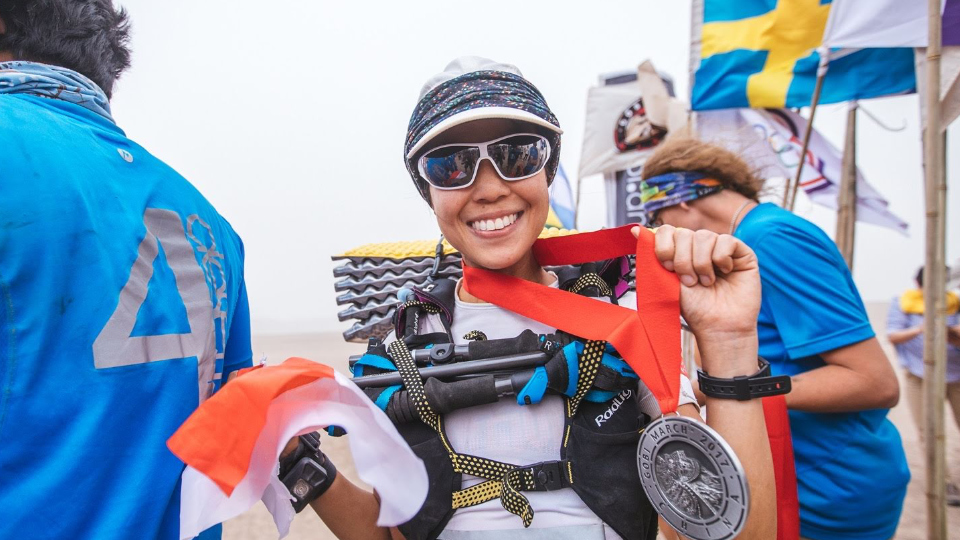
RS: When do you start to run an ultra marathon?
Wendy: I started training for an ultra in 2016. When I decided to sign up for my first dream ultra race, I haven’t even run a marathon yet. I had only completed a 21km half marathon at the Standard Chartered Marathon in December 2015. But then, I went on to train for a full marathon and completed my first full marathon at the end of May 2016 and then did my first ultra trail race at the North Face 50. That was at the end of 2016.
RS: What’s your favourite ultra distance and why did you love ultra running?
Wendy: It’s really hard to pick a favourite distance. I don’t have a favourite distance. I have ran ranging from 50km to 250km, and they all offer very different satisfaction not due to the difference in distances, but the difference in the terrain, the elevation gain and of course where each race took me to.
So my favourite kind of ultra will be those in the mountains or deserts. I do not enjoy running on the road as I love nature and it’s more interesting when you need to work hard to see breathtaking sceneries.
RS: Where do you train for your ultra marathon?
Wendy: My regular training grounds were MacRitchie, Bukit Timah Hill, and really tall HDB flats. Since there aren’t any mountains in Singapore, I would need to get my elevation gain in by doing hill repeats or staircase repeats. For a change, sometimes I will train at the beach doing zigzags up and down on the sand. Also explored other mountain biking trails for example, those at Pulau Ubin.
RS: How do you train for your ultra race? Can you share with us a training plan for a 100km race?
Wendy: My training is adapted to the type of race I am training for. The total weekly mileage and elevation gained will be adjusted accordingly depending on the distance and elevation gain of the race.
Besides, running (and walking which is also very important in ultra races), I also cross train with weight training, cycling, swimming and mobility work. Besides physical training, nutrition and hydration is another area we have to work on.
This will make or break our race if not done properly. We obviously can’t eat a regular meal on the run, so we need to get used to fuelling ourselves with the type of energy sources and hydration plan that works.
The amount of time every runner needs to train for a 100km race is really subjective. There are too many variable factors. First of all, it is not a distance that many will like to attempt or should attempt because training for something like this is a huge commitment.
It really takes over your life for at least 3 to 4 months or longer if you are less experienced. It is definitely not for beginners. There is a high risk of getting serious injuries, even during the training for the race. So, you will need to have at least a certain level of muscular and cardiac fitness to begin with in order to train for something like this.
And as mentioned earlier, there are also different terrains, elevation gain, altitude and weather conditions for each race. So, a 100km flat road race if extremely different from running a 100km in the mountains and deserts.
One who is able to win on a flat 100km but not survive a 100km mountain race. And one who is good at mountain races may not be good on the flats. We all have to train specifically to the type of race.
A rough idea of a weekly training plan for a 100km race. 3 months before race (total in a week – 40km, 800m elevation gain):
- Monday – 10km + mobility work
- Tuesday – 8km + strength training
- Wednesday – stair climb (25 floors up and down x 6)
- Thursday – 5km
- Friday – active rest day (either cycle or swim)
- Saturday – 15km trail run
- Sunday – 10km trail run
Peak weeks before tapering: (total in a week – 60 – 80km, minimum 2000m elevation gain) Long trail runs with a good amount of elevation gain mostly on the weekends, includes running and walking with added weight, fuelling with the appropriate nutrition.
It’s important to gain time on feet, still cross training with cycling and swimming as well as strength training and mobility work.
Rest and recovery are just as important. So, I don’t party at night. Usually sleep early so I can be well rested for my trainings. I make sure I eat and hydrate well at all times. Yes, it is a big commitment and I am also talking about money commitment.
I shop almost only for my races and that is enough to burn a hole in my pocket. All the gears and fuel needed are crazy. One will only do this if they truly love this sport. 100km and more is not for everyone. But I enjoy my time alone on the trails. I love to be in the nature.
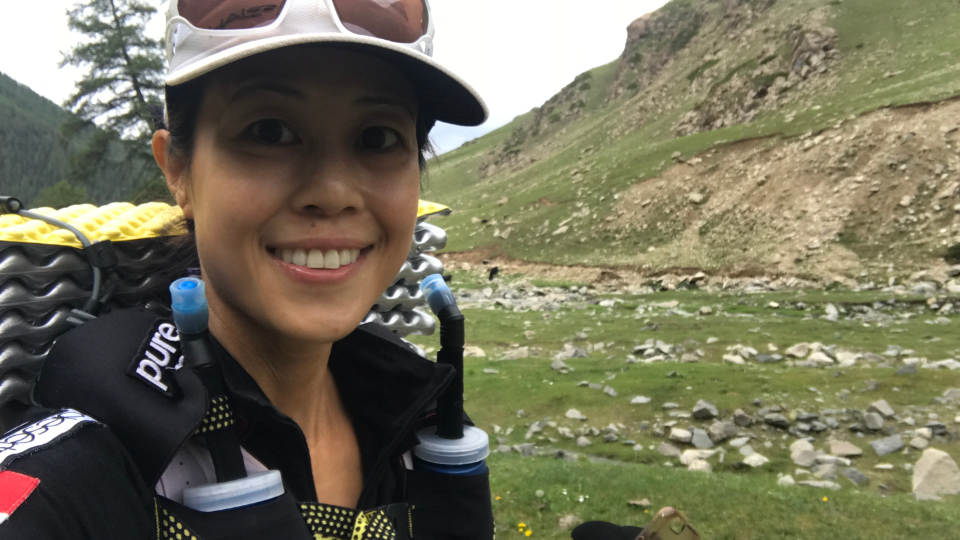
RS: What was your greatest accomplishment as an ultra runner? Can you share with us one of your most memorable race?
Wendy: Wow! That’s a tough question. There are so many things I have accomplished as an ultra runner. I would say the greatest accomplishment is to truly discover and understand the connection and relationship with nature and myself.
As a Singaporean, I never really realised how much I need to be in the nature as a human being. A large part of my life was spent in the dance studio or behind the computer. When I started ultra trail running, it allowed me to see one very important aspect that was missing in my life.
The need to reconnect with nature is so strong. That really helps to bring out my inner strength to train and complete such tough and amazingly beautiful races. It makes me much stronger physically and mentally and anchors me down to earth.
My most memorable race is the Gobi March 2017. We had to run 250km over 7 days, across the Gobi Desert. It’s a self-sufficient race, so we had to carry all our food for all the days, our sleeping bag and all that we need to survive during the entire duration.
The weather was close to 0 degrees Celsius at the lowest and went up to about 48 degrees Celsius. So, we needed to carry gear that we need for extreme weather conditions like rain, wind and sandstorms. I ended up carrying 12kg and I only weighed 43kg, so you can imagine that it’s rather heavy for me to run with that.
But this being my first big ultra, I wanted to be sure I had enough fuel. Thankfully, I survived, thanks to all the strength training. This race is the most memorable because it is my first multistage race, so I had to learn everything for the first time. I also got to know some of my best buddies from this race.
We spent so much quality time training and running together. Seeing one another at their best and they’re worse. All smelly without showering for 7 days and no change of clothes, horribly loud snores, bare face, disgusting blistered feet, peeing and pooing all natural in the nature etc. It’s truly unique and real.
My training buddy, Rob, and I were strangers. But after this race, I dare say we will be buddies for life. This race also burns a hole in my pocket. Not sure how much I spent in total but I would say about S$10,000!
RS: What are some of your short term goals?
Wendy: Currently, I am taking a break from ultra running for my other personal goals, which I believe is an ultra itself. I guess it’s a good opportunity for my body to recover from old injuries.
But I am still continuing with strength training, dancing, hiking and running in the mountains. It’s definitely tempting to go back to ultra trail running, so I am hoping that my other personal goal will be complete soon. So that I can get back to it.
RS: What you have learned as an athlete? What traits do you think ultra runners must possess?
Wendy: Besides, all the technical skills that I have picked up, I have learned to know when to push and when I should really stop in order to achieve better results.
Ultra runners must be physically fit, but have extremely strong mental fitness. The ability to find strength in their darkest moments is what’s going to bring them to their finish line.
RS: What tips will you give to someone who wish to try ultra running?
Wendy: You have to be true to yourself. Find out how much work you need to put in from reliable sources or even a running coach and then decide if you are willing and able to make those sacrifices.
Speak with your family, partners and friends make sure that they fully understand and will support you in this journey or else you may have other big problems to deal with while you are trying to train for that ultra.
You can follow Wendy on Instagram: @coachwendysg
2. Ultra Runner: Jeff Lau
Bio: 29 year-old Malaysian Graphic Designer
Jeff has started running since 2012 for 10km in a week. Unfortunately, Lau got injured in 2013 when he tore his ligament and went to surgery. After his ligament operation, Lau has to take a rest for 9 months in order to get back on track again.
During Lau’s recovery period, he told himself that he wants to do something good in his fitness journey once he is fully recovered.
Always push yourself to the limits but at the same time, don’t take your body for granted.

RS: When do you start to run an ultra marathon?
Jeff: My first ultra marathon was in 2014 – 257km Marathon des Sables.
RS: Why did you love ultra running and what’s your favouring ultra distance?
Jeff: My favourite ultra distance is any distance that is more than 200km. I love ultra running because it expands my self-belief, own satisfaction and most importantly is every single ultra run, I run for a good cause.
RS: Where do you train for your ultra marathon?
Jeff: I train on the road, at the gym and at home as well. A strong core and hip is important for an ultra marathon. To improve myself, core training is one of the most important part of it.
RS: How do you train for your ultra race? Can you share with us a training plan to train for a 100km race?
Jeff: These are my ultra race experiences:
- 257km Marathon des Sables (Mds)
- 560km Canada Yukon Arctic
- 230km Amazon Rainforest
- 230km Sweden Arctic
- 273km G2G Grand Canyon
- 10 ironman in 10 days
I would say different ultra race will undergo different training, due to the condition for each race is different such as the weather, the altitude, the distance and etc. For example:
- 257km Mds is a self sufficient race, I will need to carry my food and equipment for 7 days, and the backpack is around 10kg, hence, I will need to carry 10kg backpack and run on sand dune for 7 days. This training focus on shoulder, thigh, core muscle training. Besides that, I ran 35km on the road with 7kg backpack twice a week for 3 months, so I can get used to the feeling during my run with a heavy backpack.
- 230km Amazon Rainforest, the altitude is high, and I need to climb up to 1000m high within 5km, the training focus is different from Mds as this we required a strong core, thigh and back. This race is a self-sufficient race.
- 560km Canada Yukon, I will need to pull a sled that weight around 35kg. For the training part, I need to run and pull a tyre and run.
I think everyone fitness level and body condition is different. As for myself, I need at least 3 months to prepare an ultra race. I think whoever did 42.2km (full marathon), they can easily finish 100km. To me, ultra marathon is more about mental.
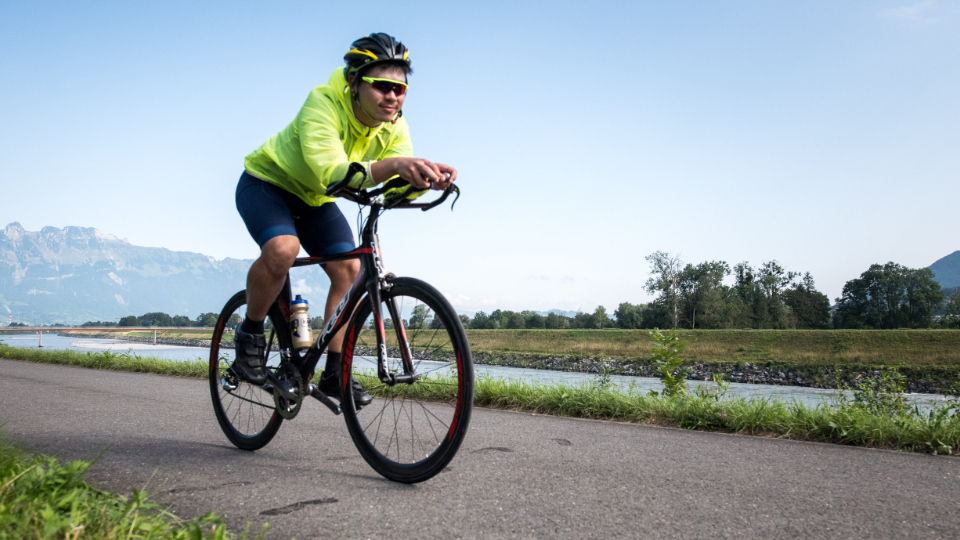
RS: What was your greatest accomplishment as an ultra runner?
Jeff: My greatest accomplishment as an ultra runner was completed Swiss Ultra – DECA 2 months ago. This is my most memorable race because I need to complete 10 ironman in 10days, everyday I will need to swim 3.8km, cycling 180km and run a full marathon 42.2km. Total up is 38km swim, 1800km bike and 422km run in 10 days.
RS: What are your short term goals?
Jeff: My medium/short term goals at the moment is to share about my ultra running experience with others. I wish to inspire and motivate more people to do ultra marathon.
RS: What you have learned as an athlete? What traits do you think ultra runners must possess?
Jeff: I learned as an athlete – Always push yourself to the limits and at the same time, don’t take your body for granted. A strong mental is the trait that I think ultra runner must possess.
RS: What tips will you give to someone who wish to try ultra running?
Jeff: What you need to do now is to register an ultra marathon before you start your training.
You can follow Jeff on Instagram: @jefflau.ultra
3. Ultra Runner: Alan Li
Bio: Born in Hong Kong and based in London, UK. 42 year-old technical advisor.
Alan Li has been running for around 15 years. In those years, Li has completed many prolific races such as Marathon de Sables, UTMB, HK100 etc. Li is also a run leader for ASICS UK where he leads community runs in the evenings.
Have confidence in myself and the strive for everyday to become a better athlete, as well as a better person.
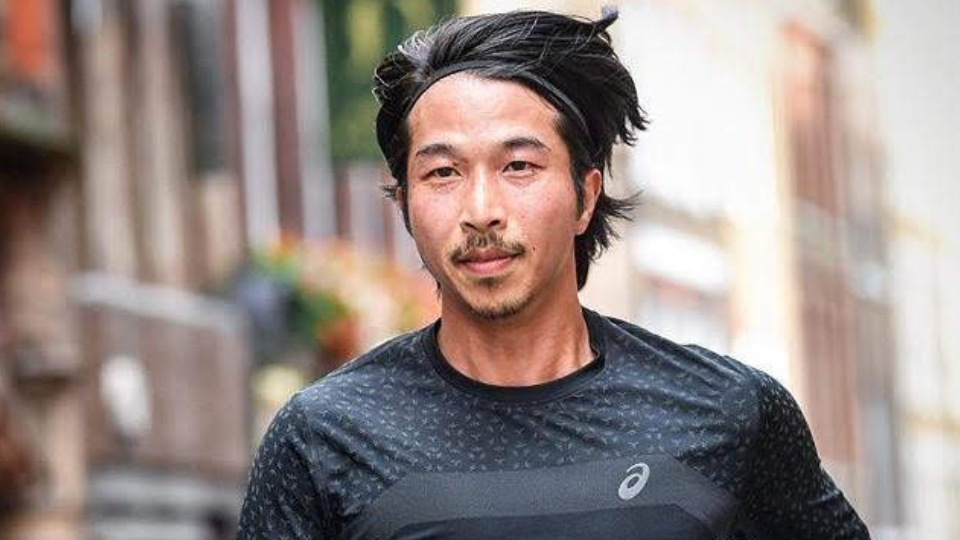
RS: When do you start to run an ultra marathon?
Alan: My ultra marathon journey started off with the most unusual of circumstances. A leg break sustained from football meant I was immobile for 6 months, I fell out of love with football so I quit the sport, disposing my boots and shin pads.
Now that my passion for football was gone, something had to be substituted in to keep myself active. I was good at running, ran a few half marathons and 10Ks, so I thought what if I took the running further?
RS: Why did you love ultra running and is there a favourite running distance for you?
Alan: No preferred distance as I’m passionate about running all distances and terrains. I tend to run different sized races in the build up to my ‘A race’.
RS: Where do you train for your ultramarathon?
Alan: Being based in London, where there isn’t much gradient, finding good terrain to train on is a challenge. My training location on the weekends varies from a 4 hour single trip to the Welsh mountains, the coastal paths in the South of England or trail routes that are just outside of London.
RS: How do you train for your ultra race? Can you share with us a training plan?
Alan: My schedule during a 10 month season usually consists of 40 hours of work, 10 – 13 hours time on feet and 4 hours in the gym a week.
My work and family life sometimes does get in the way of training, therefore I tend to use time as a unit rather than distance as I find it less pressure meeting weekly mileage goals. Time on feet training includes running hills, track, and long slow runs.
Hiking is also included, a part of the training that is often neglected by most. In the gym, I would spend each half session with mobility work and stretching. The rest of the half, I alternate between strength work with upper body and lower body.
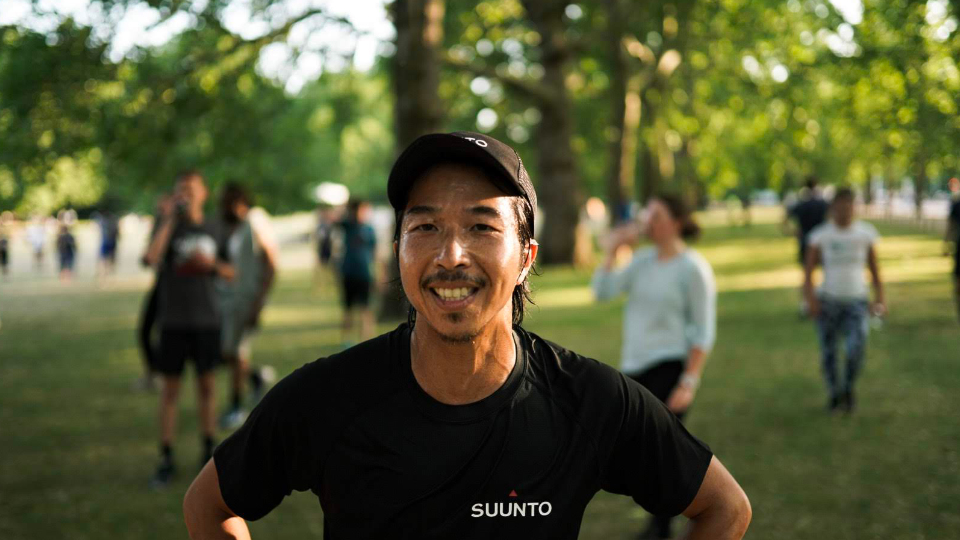
RS: What was your most memorable ultra marathon race?
Alan: In 2013, I signed up for my first adventure race, the ‘Himalaya 100 Miles Stage Race’. It was my first mountain running as well as multistage racing experience.
The event wasn’t too large, therefore it was great for camaraderie. This was the catalyst race for me to see more of the world and enter bigger and scarier races, as you always ask yourself “How do you better this one?”
RS: What are your running goals?
Alan: I am in the middle of my coaching badge in the UK, so currently this is my long term goal. On the racing front in 2020, I will be running the London Marathon and Comrades Marathon in South Africa.
I’ve yet to run in Singapore, so this is firmly in the list of to do’s. I’ve met many super passionate runners from Singapore through my running journey, so this is going to be one of my goals.
RS: What you have learned as an athlete? What traits do you think ultra runners must possess?
Alan: Confidence in myself and the strive for everyday to become a better athlete, as well as a better person. Mental toughness or grit and the ability keep in control when encountering obstacles. Panicking just saps energy away, so the best approach is to keep calm.
RS: What tips will you give to someone who wish to try ultra running?
Alan: My tip for someone is to start out by not to rush into it. It’s all very easy to see what others are doing and have achieved through mediums such as social media. Start with short races and then slowly progress to the bigger and scarier distances. PRACTICE, PRACTICE, PRACTICE! Practice eating whilst on the run, practice what the terrain will be like and use the kit (i.e. shoes, pack, bottles, jacket) that will be most suitable to you.
You can follow Alan on Instagram: @ultralan
4. Ultra Runner: Emilie Tan
Bio: 35 year-old French-Canadian/Australian Expat in Singapore.
Emilie Tan lives in Singapore with her husband Luke, a 2½-year-old daughter Sienna and her cat Chubbs. Emilie works as an education manager in FIT Singapore, an academy for exercise professionals.
Emilie biggest passion is running, any distance from 5km, but she prefers anything over the marathon distance aka ultra marathons on both roads and trails. Emilie is also passionate about plant based nutrition as she has been a vegan since 2012 and it changed her life for the better.
I learned that I am much stronger than I think, that “having a second wind” does happen all the time and that you should not abandon even if you feel a bit off at the beginning of a race.
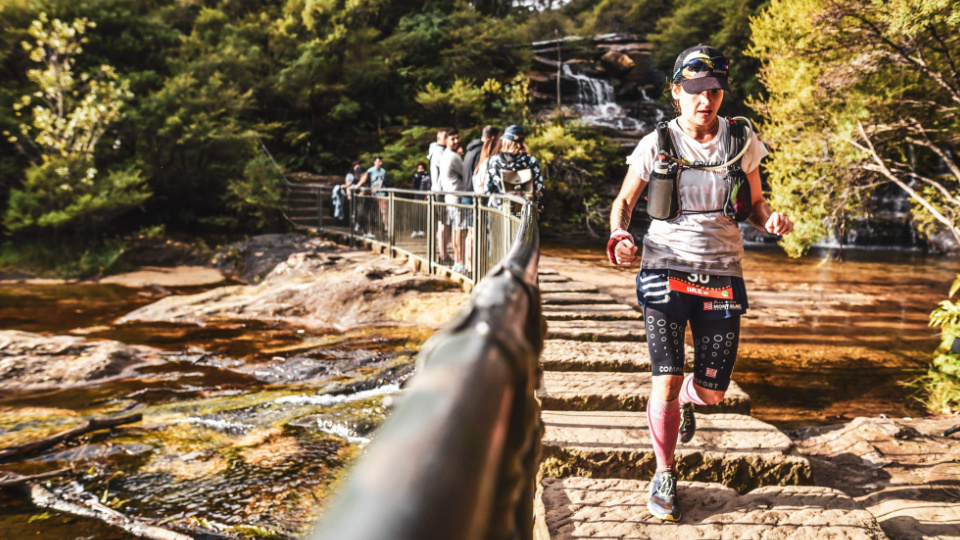
RS: When do you start to run an ultra marathon?
Emilie: I signed up for my first Ultra (Two Bays Trail Run 56km in the Mornington Peninsula, Victoria, Australia) the day after I completed my first marathon, which was the Melbourne Marathon in October 2014.
RS: Do you have a favourite ultra distance?
Emilie: I would say my favourite distance is 100km as the longer the better for me, and I have not yet adventured over that distance. But I also quite like the 50 km distance.
RS: Where do you train for your ultramarathon?
Emilie: I train around my house in Serangoon Gardens, Singapore. I also do a lot of laps of Bishan Park. For trails, I love MacRitchie Nature Reserve.
I do get some vertical training as I do infinite laps of Bukit Timah Hill (BTH) aka The Everest of Singapore. I also use races as ways to improve my technical running.
I will be travelling to Hong Kong to do “training races” as I have a mountain ultra planned in my near future. I am also planning to spend a few weekends in Chiangmai, Thailand, to train.
RS: How do you train for your ultra race?
Emilie: I have an amazing coach who designs my training programs. His name is Scotty Hawker and he himself is a very accomplished runner (3rd at UTMB this year!). I trust him at 150%. He knows exactly when to push me and when to hold off a bit. I can sometimes run up to 12-15 hours (150-160km) on big weeks, but some weeks are much easier. I try to also fit in some strength and conditioning.
It varies a lot, but I run 6 days a week most weeks. I will do most of my runs at an easy pace. One run per week will most likely be a tempo/race pace effort, another might be a quality session at the track like 8-12x800m or something similar (my favourite kind of training!).
It also depends on the distance I am training for, one or two longer runs, sometimes up to six hours with lots of repetitions of BTH for a hilly trail ultra or 50-60km around Bishan Park for a road ultra with faster miles sprinkled in there.
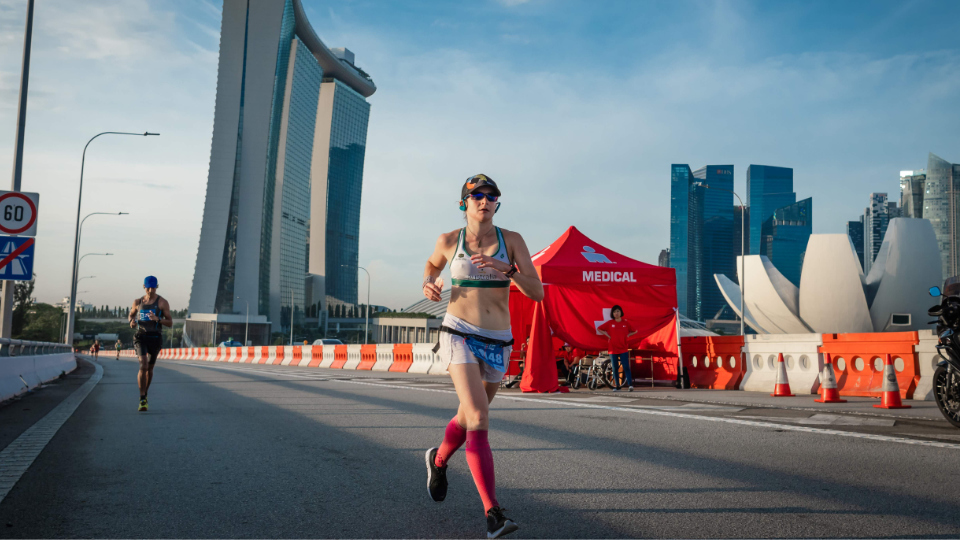
RS: What was your greatest accomplishment as an ultra runner? What’s your most memorable race?
Emilie: Gold Coast 100 2018, I ran this 100km race on roads to qualify for the Australian Team of the 2018 100km World Championships. I self paced a 100km in 8:33:XX. Probably one of the hardest things I’ve ever done (second to drug-free childbirth!).
I was also crowned the 2018 100km Road Australian Champion and was selected as a part of the Australian National Team for the 100km Worlds.
As for the most memorable race. It will be Ultra Trail Australia 100 2019, just an amazing race overall. The first half was quite a bit technical for me, but I stuck it out and stayed strong. Finishing 5th lady, super close from 3rd and 4th in a world class field really gave me a lot of confidence.
RS: What is your short term goals within the next year or so?
Emilie: Top 10 (Top 5 would be an absolute dream!) at CCC (race in Europe, in the same weekend as UTMB), Sub 2:50 road marathon, Sub 8:15 (or even sub 8) 100km road.
RS: What you have learned as an athlete? What traits do you think ultra runners must possess?
Emilie: I learned that I am much stronger than I think, that “having a second wind” does happen all the time and that you should not abandon even if you feel a bit off at the beginning of a race. You must be a problem solver and be adaptable.
RS: What tips will you give to someone who wish to try ultra running?
Emilie: First, follow a plan. If you cannot afford a coach, get a cookie cutter plan for Runner’s World or something like that. If you have something to follow, you are much more likely to get the training done. Second, learn from the veterans, experienced runners. Don’t be scared to ask questions.
There are also a bunch of YouTube shows and podcasts on ultra running where you can learn so much: Ginger Runner Live, Trail Runner Nation, Ultra runner podcast, etc.
Last, use your long run to practice your race gear and nutrition. Even though I have not followed this exact advice a few times and regretted it most of the time: nothing new on race day!
You can follow Emilie Tan Instagram: @emilieendurancerunner
5. Ultra Trail Runner: Been Lee
Bio: 34 year-old South Korean
Been Lee was born in Jeju Island, and lived half of her life in Seoul and Europe. Lee did her first summit hike on Mt. Halla at the age of 4, and started distance hiking throughout South Korea at 8 with her mountaineer father.
Lee feels so alive when she is running on the trail but she gets exhausted easily when running on the road as this is a mystery with an obvious answer to that.
You don’t always have to fight with others, but instead with your lazy and weak inner self. Your goal is to outdo yesterday’s you.
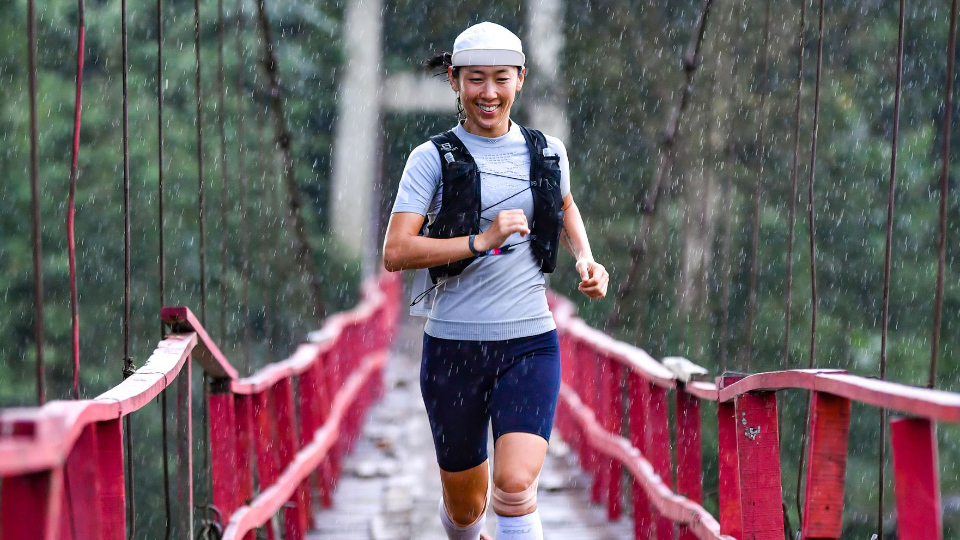
RS: When do you start ultra trail racing?
Been: I started ultra running in my first year of running. I ran over 3km for the first time in my life as a preparation for a half marathon in March 2016.
Then, I ran a 39km trail race, and DNFed a 50km trail race, which steamed me up to go for something reckless. I signed up for a 100km ultra trail race in November the same year and finished second to last.
RS: Why did you love ultra trail running?
Been: I had done up to 230km so far and I should say I prefer something just over 100km. My body, usually perceives the first 20-30km as a warm-up and starts to boost after that.
Some runners are fast and good at shorter distances, and I happen to last longer and perform better in ultra. It feels great when you accomplish what not everyone can do.
RS: Where do you train for your ultra trail running?
Been: I live on Jeju Island where Mt. Halla(1,950m), the highest mountain in South Korea, lies. There are several trails in the national park, but also smoother options in the lower slopes with hundreds of volcanic cones.
RS: How do you train for your ultra race?
Been: Ironically, I don’t follow any special training plan for any specific race. My training is either fast hiking or jogging in the woods when I feel like to.
Sometimes, I train 5 days a week, sometimes once a month. I focus more on taking high quality nutrition to have my stamina ready from deep inside.
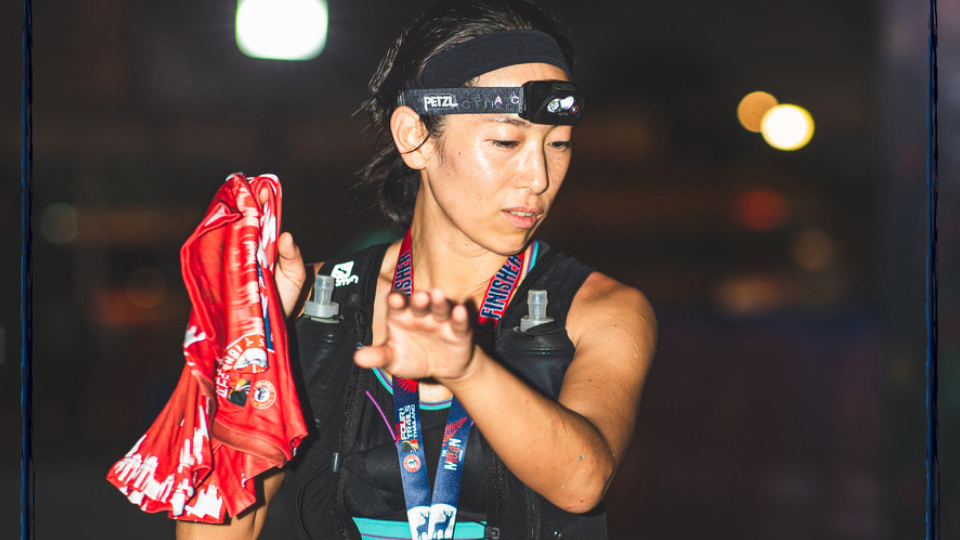
RS: What was your greatest accomplishment as an ultra runner?
Been: I used to be satisfied with new friends and finisher medals in my first 1.5 years just like many other fun-runners. TMBT(The Most Beautiful Thing, Malaysia) 2017 was my first overseas race, which turned out to be a turning point for me.
I joined the race alone just because I liked Mt. Kinabalu. But then I found myself in a strange place in complete darkness. I wanted it to be done so badly and that’s when I realised that I was a born adventurer with good endurance. I finished sixth among 43 female finishers. The first time I ranked high.
RS: Do you have a running goal to fulfil?
Been: I am joining Oman by UTMB 170km on the last weekend of November to earn an entry for UTMB 2020. Besides that, I am also registered for Rinjani100 (Indonesia), that is known as the most brutal trail in Asia.
As I have completed UTCR(Ultra Trail Chiangrai, Thailand) Ultimate 230km, one of the longest trail races in Asia, I shall give a dare to Tor de Géants(330km) and UTMB PTL(300km) in the Alps. Apart from races, I am thinking about running Baekdu-Daegan, which is a mountain ridge trail stretching across the entire Korean Peninsula.
RS: What you have learned as an athlete? What traits do you think ultra runners must possess?
Been: Competitive spirit. You don’t always have to fight with others, but instead with your lazy and weak inner self. Your goal is to outdo yesterday’s you, plus physical and mental endurance.
I believe good food and enough rest will help as well. Everyone trains, but your training can truly be over after eating and resting well. There is no need to strain your body and soul. Love yourself.
RS: What tips will you give to someone who wish to try ultra running?
Been: Never be overconfident. I have seen many runners in hard situations, and failure is highly probable if you face it during a race. But don’t underestimate yourself, either.
Sometimes, you have to push yourself to step forward and level up. Don’t be scared. You will make it if you are well prepared.
You can follow Been Lee on Instagram: @ultratrailgirl
6. Ultra Runner: Marnie Ahmad
Bio: 35 year-old Bruneian Marnie Ahmad. A full time school teacher with a passion for ultra-races.
Marnie considers herself a late bloomer in the running scene given that she started at age 29. Within 6 years of running, Marnie has participated in 65 racing events (from short distances to ultra distances).
Marnie’s two proud accomplishments as an ultra-runner would be the 100 miles trail race in Thailand 2017 and the 200k ultra in Malaysia 2019.
Though her first passion is running, she also enjoys cycling and currently training for future cycling races.
It is not just the ultra-running distance that attracts me but the whole experience of making new friends, immersing myself in different cultures and racing through beautiful sceneries.
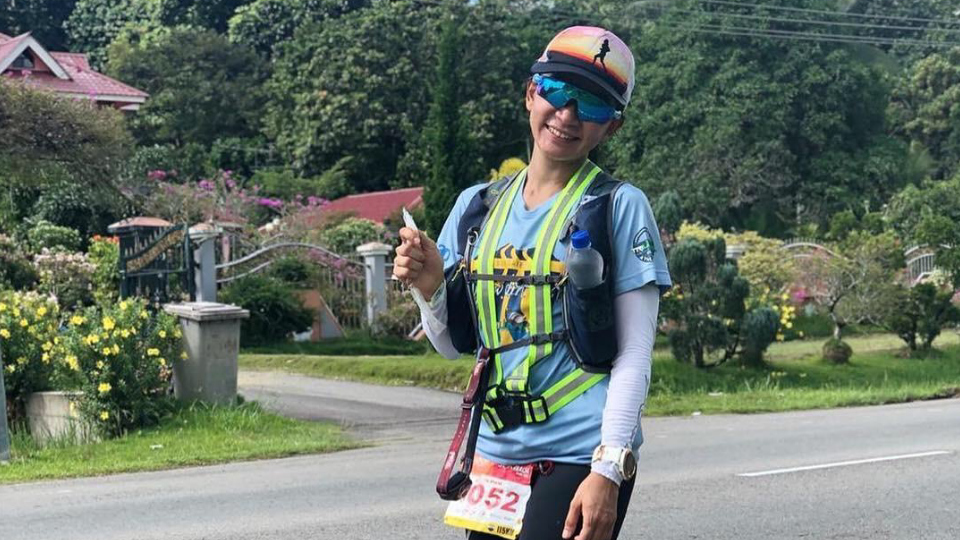
RS: Which was your first ultra marathon race?
Marnie: I recall my first race back in 2014 ‘Chasing Sun 50K ultra marathon. It was organised by a group of passionate runners who wanted to push the envelope further. Though it was a non-competitive race, I was the third person to cross the 50k finish line and that marked the beginning of my ultra-journey.
RS: What’s your favourite ultra-distance?
Marnie: I do not see myself as being picky when it comes to distances, but given the choice, the longer it is, the harder the challenge, the sweeter the reward when you cross that finish line.
There is something about pushing your body beyond its limits, mentally and physically, that I love. That sense of achievement knowing you survived such a difficult and challenging feat is exhilarating – nothing beats that amazing feeling of accomplishment.
RS: Where do you train for your ultramarathon?
Marnie: As long as the road (or trail) is runnable – I am there. I also do cross training in the gym and cycling. I believe in multi training because it contributes to my strength overall.
RS: How do you train for your ultra-race?
Marnie: When I first started my ultra-journey, I would prepare 16 weeks in advance. Mileage and recovery time for each week would vary. For 100km and above, I would spend 4-6 hours training during the weekends and 8-12 hours during peak weeks. I personally prefer to train by the number of hours instead of distances.
For example, in the lead up to a big race, I would register for small races because I think it is a good indicator of whether I am prepared or not. If I am not prepared, I would still have time to address my weaknesses to ensure that I do well for the big race.
Aside from the mileage, I also had to mentally prepare for the race. From start to finish involves a lot of planning – calculating my running pace, when to ‘refuel’, when to nap, how to push through in difficult weather conditions as well as how to avoid injury. All those factors come into play during training and the race.
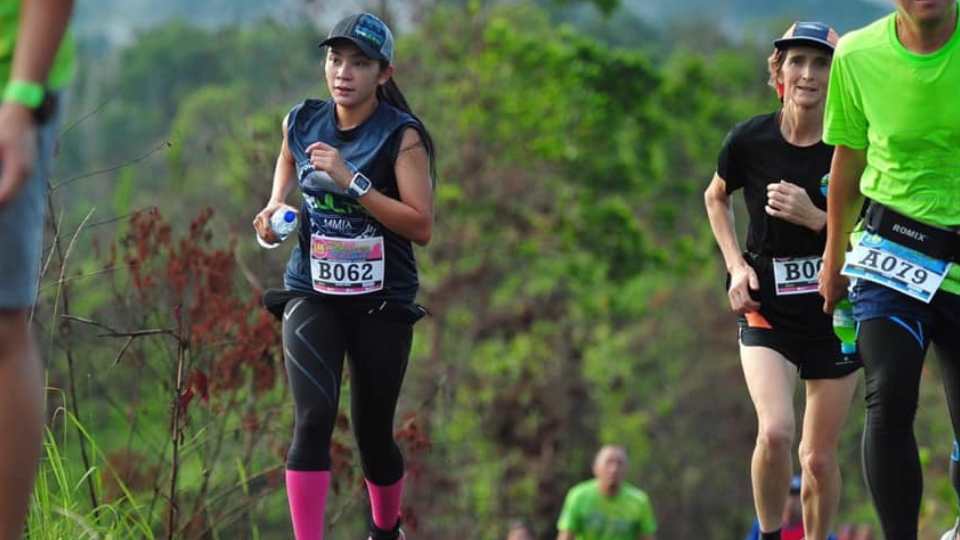
RS: What was your greatest accomplishment as an ultra-runner?
Marnie: This is a tough question because every race is a big deal to me. Looking back, I would say that my greatest accomplishments as an ultra runner was when I finished my first 100 mile trail race in 2017 (ranked 9) in Thailand; and 200K ultra marathon in Malaysia in 2019 (ranked 2).
What made it memorable is that I was the first Bruneian woman who accomplished both distances. For the record, I participated in 19 ultra-races and 12 of them were podium finishes.
RS: What are your running goals?
Marnie: My goals are to achieve more PBs (personal best) and if I had a chance I would love to run in other countries.
So far, I had the privilege to race in Malaysia, Singapore, Hong Kong and Thailand. It is not just the ultra running distance that attracts me, but the whole experience of making new friends, immersing myself in different cultures and racing through beautiful sceneries.
RS: What you have learned as an athlete?
Marnie: Discipline. I truly believe that discipline plays an important role if you want to be a successful athlete – and this is especially so when you are not a full time athlete and have a full time job. Having to juggle your work and training preparations is not easy and without discipline, one can burn out easily.
Having a good attitude is also important. Be optimistic and see the positive side of things even if the race did not go your way. There is no such thing as a bad race.
I personally do not see it as a failure if my race did not go as planned because the best teachers are experiencing – the good ones and the bad. Stay humble even when on top because there is always someone who is going to be faster and better than you – and that is okay.
I also believe that being a successful athlete is one who can manage training with family time so time management is important. Even though I am tired post training, I make it a point to always spend quality time with my family and do things together.
I am happily married for 12 years with an amazing and supportive husband who truly understands my passion for running. I have two beautiful daughters aged 11 and 9 who also understands why mummy does what she does. They are my backbone and support system. Without them, I do not think I would have achieved all that I have so far.
RS: How can someone try ultra-running?
Marnie: Train your mind because your mind sets your limits. Train independently because at times, that’s how one discovers their true potential. Train smart because good preparation is key. Lastly, always expect the unexpected.
You can follow Marnie Ahmad on Instagram: @dazzlingmarnie
7. Ultra Runner: Rene Fosdal-Griffin
Bio: 50 year-old Danish IT Developer
At the age of 50, Rene Fosdal-Griffin sit at a desk most of the time during work. 3 to 4 years ago, the scale started showing some worrying numbers and Rene realised that hiking on weekends and walking to the pub on Saturday morning probably wasn’t enough exercise.
Rene started running and changing his diet – for the first 6 months he ran 5-6 km every day, only occasionally taking a day off. But Rene’s weight started to drop and he started to feel bad if he didn’t run. At this point, Rene was addicted to running.
Then, Rene met his wife – a personal trainer and running coach. She was not impressed with Rene’s running style (or lack of). After a few weeks she corrected a few things, changed his diet further and started talking about races.
2 years later, several half-marathons, marathons and 2 ultra-marathons later, always looking for a new challenge that will fit in with Rene’s job.
It’s not just about running. The most important thing I learned is that the mind is a major player in running long distances.

RS: When do you start to run for ultramarathon?
Rene: I did my first ultra-marathon in April 2019 with “Two Oceans Marathon” in South Africa, which is 56 km, followed by the Craze Ultra 100 km here in Singapore, so I am not what you’d call a seasoned ultra-runner. I still feel like a beginner, but I’ve learned a lot of those two races.
RS: What’s your favouring ultra distance?
Rene: So far, I’ve tried the 56 km and 100 km distances. The 100 km is my favorite as the way of running 100 km is vastly different from running 56 km. The 56 km is similar to a marathon – you run and hydrate along the way, water stations 4-5 km apart.
When you move to 100 km it’s a different kind of race – you have your own hydration between checkpoints and you have to eat sensibly – there is a lot more to manage and if you get it wrong it can go terribly wrong. I like that challenge and the element of “danger”.
RS: Where do you train for your ultramarathon?
Rene: Usually, I start 5-6 months before and either do a long distance race a few months out or if nothing appropriate is available, I make up my own long route and use that as a practice race.
RS: Do you have a training plan for running an ultra marathon?
Rene: When I started training for my first 100 km I thought it required a lot of long runs, but it was not that much different from running a marathon.
There are a few weekends of extremely long runs (40-50 km) and a few more weeks with long mileage but overall it’s similar to marathon training. For the Craze Ultra training started 4 months out and 3 weeks before the race I started tapering with only 25 km the last week before the race.
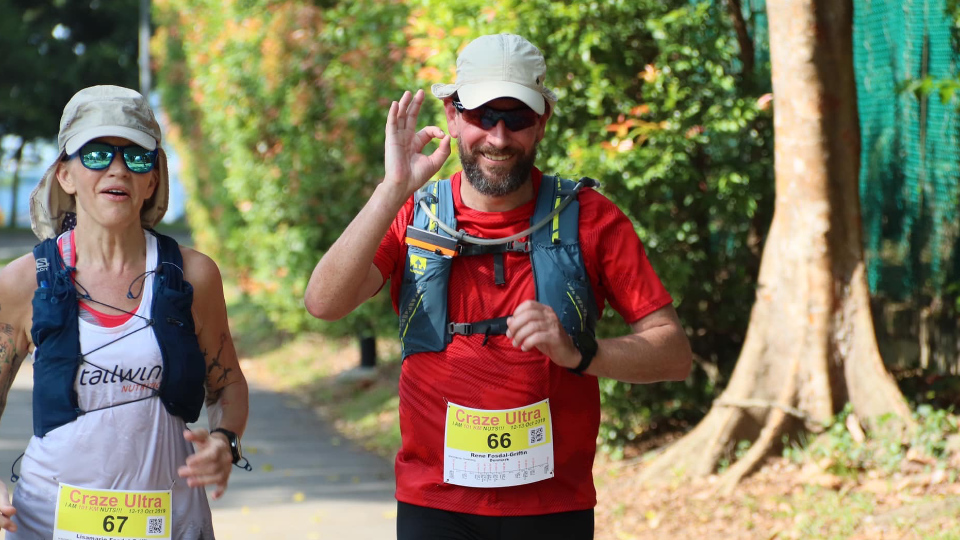
RS: Can you share with us some of your most memorable races?
Rene: The first one will always be special – I have a weakness for South Africa and running the Two Oceans Marathon was an amazing experience.
A beautiful venue, challenging route and some of the best spectator support along the 56 km route. And just as with all the races I’ve done, the runners are such a great and friendly bunch – yes, we race, but never more than we can share a joke and a laugh and support those that need it along the way.
What are your running goals?
Rene: The next ultra will be the Ultra-Trails Drakensberg in South Africa – it’s another 100 km but this time there is the added element of mountains (the Craze Ultra had barely any elevation but instead heat was the major challenge).
In February or March, a 50 km or 70 km race will be added to give some elevation training – Bukit Timah and Kent Ridge are good for basic training but some real trail and hills is needed. I hope to take on a 100 mile run during 2020 or early 2021, but for now I stick with the 100 km distance.
RS: What you have learned as an athlete?
Rene: The most important thing I learned is that the mind is a major player in running long distances. Working out and strengthening your muscles is extremely important as well – it’s not just about running.
These long runs are done with a backpack with 2-3 litres of water, food, first-aid kit and other little things, easily 4-5 kg on your back for 100 km. A strong body is important.
And as ultra runners we must have stubbornness, a hint of insanity and most of all desire to succeed and be convinced that nothing is impossible.
RS: What advice would you give someone who wish to try ultra running?
Rene: If you’ve run a marathon, my advice will be to take the next level, which is 50 km, maybe 70 km and see how that works for you. It is not necessary to jump straight to 100 km or 100 miles – take it in steps and see how you like it.
You can follow Rene Fosdal-Griffin Instagram: @a_geek_runs_far
8. Ultra Runner: Azlan Ithnin
Bio: 31 year-old Singaporean
Azlan Ithnin started distance running on the road since 2009 before moving into trail running since 2013. In between, Azlan document his running and travels on social media and on his website. Azlan also founded a running group, “Live Low Race High” consisting of friends and acquaintances of trail running.
I’ve learnt that DNF’s is a perfect platform to reflect and improve oneself.
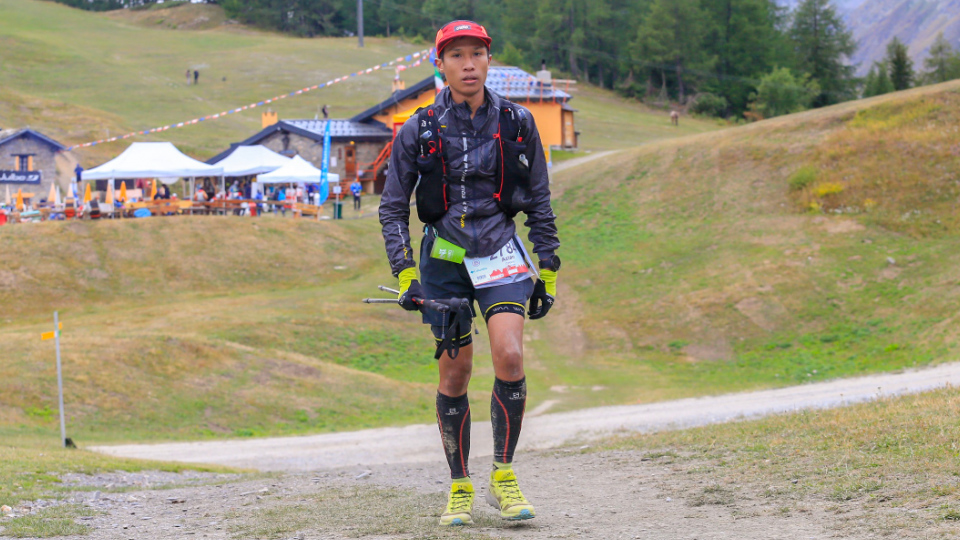
RS: When do you start to run for ultramarathon?
Azlan: I ran my first ultramarathon at a race called the Sabah Adventure Challenge 2013, a 3-day stage race. I was quite naive and new to the sport then and I figured running a reasonable distance each day, with a rest after each stage wasn’t as bad as it sounds.
However, it turned to be the hardest race I had done up that point, with it being my first time running alone overseas and with little specific training.
But I had great fun meeting the runners there and just running a different terrain and country. That race opened myself to the endless possibilities of travelling, racing and meeting new people.
RS: Do you have a favourite ultra distance?
Azlan: I don’t have a favourite distance; all ultra races are tough! Each has its own characteristics which makes it challenging. I’ve been running 50 to 100k races up to this point, but I hope to complete my first 100-miler next year. Personally, ultra-running has allowed me to be at peace with myself and to disconnect from everyday life.
It’s a simple act of just running and focusing on the route at hand. It also allowed me to meet like-minded people and know them on a more personal level. As strange as it sounds, people who run trails are generally friendly, warm, open and honest about themselves.
We do, of course, go to the extreme to prove to ourselves and others, then an ultramarathon of any level can be done. The ultra-running community is close-knit and supportive, even through the hardest of times.
RS: Where do you train for your ultramarathon?
Azlan: On weekends, I usually run from MacRitchie to Bukit Timah, or within Bukit Timah itself. On weekdays, I run to Kent Ridge Park from my office in Dover.
RS: How do you train for your ultra race?
Azlan: I train 5 days a week; 4 days on the road and 1 long trail session on the weekend. My typical training weeks are as follows.
The workouts can be swapped around depending on work commitments or other personal engagements.
- Monday – Day off/Strength Training
- Tuesday – Hill Repeats
- Wednesday – Easy Run
- Thursday – Interval Training/Stairs
- Friday- Day off
- Saturday – Easy Run
- Sunday – Long Run
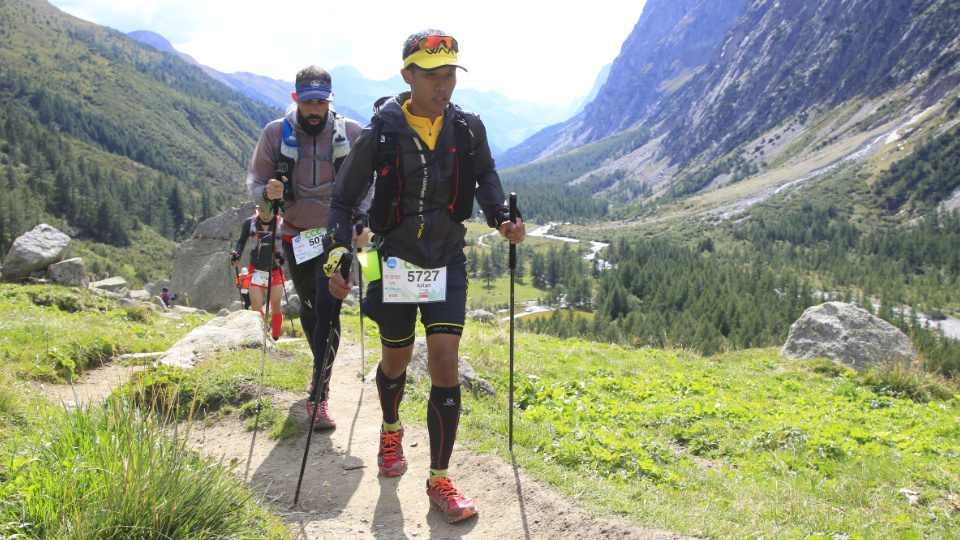
RS: Can you share with us one of your most memorable race?
Azlan: In 2017 I completed the UTMB CCC, the sister race of the UTMB. It starts from Courmayeur, through Champex before finishing in Chamonix. It has a total distance of 101 km and 6,100 m of climbing. In 2016, I DNF’ed my first attempt of that race and knew that there was no guarantee if I could go back next year.
But I was lucky with the ballot and returned to Chamonix to finally complete the race in the pouring rain. It was a sweet finish to an otherwise disappointing 2016 racing season.
Beyond that, I was happy to have made the trip with friends and fellow runners who were on the trail running capital of the world.
RS: What are your immediate running goals?
Azlan: I hope to return and complete the UTMB 100-mile which I DNF’ed last year. I have planned a few shorter trail races in 2020 to build my speed and also 100k training races in the lead up to UTMB if it does happen.
Other than trail running, I also hope to run a sub-4-hour marathon.
RS: What you have learned from ultra running?
Azlan: Ultra-running is a long term sport which requires commitment, patience and perseverance to see the goal come to fruition.
While there are success stories of being able to achieve those goals in a shorter period of time, I’ve always been someone who takes a longer time to master something.
I’ve learnt that DNF’s, while disappointing and soul-crushing at times, is a necessary part of the development of oneself in the sport. DNF’s are a perfect platform to reflect and improve oneself.
RS: Can you share some tips for someone who wishes to try ultra running?
Azlan: Don’t be afraid to reach out to experienced runners or groups through social media to know more about a particular race or how to train for one.
New trail runners these days have an abundant source of knowledge to draw from as the sport continues to rise in popularity.
You can follow Azlan Ithnin on Instagram: @azeanic
9. Ultra Runner: Ian Lye
Bio: 40 year-old Singaporean brand ambassador for Rabbit (US Apparel brand), Salomon Singapore and Simple Hydration (US hydration brand)
Currently based in Geneva, Switzerland, Ian lives with his wife and a 3-year old daughter.
Ian is an explorer at heart who loves the outdoors. Trail running and ultra-marathons races have become a means for him to be in nature to discover new places and races and seek out new experiences around the world. In order to feed his hobby, Ian works in an investment bank in Geneva.
Training for ultramarathons has taught me the value of consistency, commitment and hard work. Without those values, it would be really difficult to show up and get the best out of myself on race day.
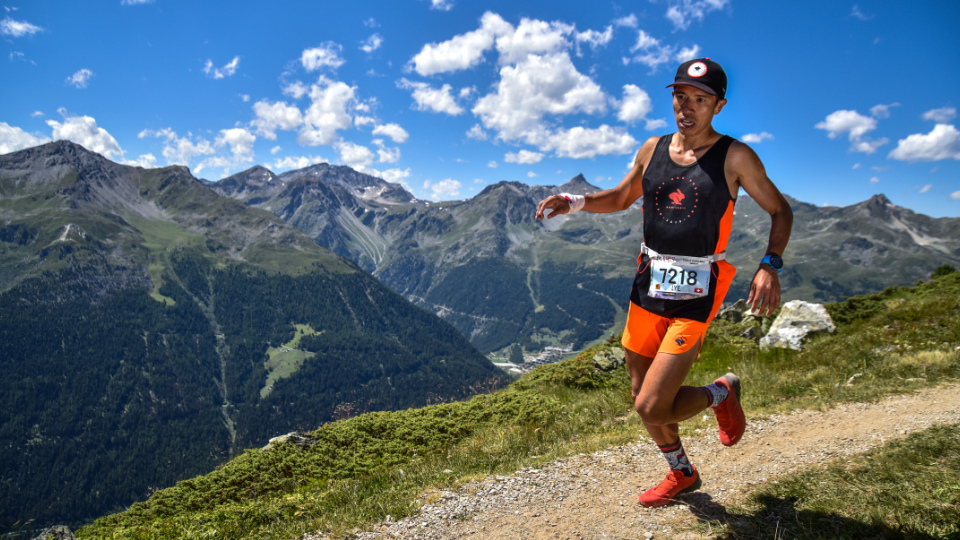
RS: When do you start running ultra marathons?
Ian: I ran my first Ultramarathon in Sep 2013; it was the Sundown Marathon 100km race, a road ultra. 3 weeks later, I ran my first trail Ultramarathon, a 50km race at The North Face 100 in Singapore.
RS: Why did you love ultra running?
Ian: I like ultra of all distances, as I believe they challenge me in different ways. That said, I probably have a soft spot for races in the 100km-120km range.
It’s a distance that’s long enough to challenge me, and where I really get to experience the highs and lows of running an ultra that make this sport so unique, but it’s still short enough that I’m only out for one night, and I have my own warm bed to look forward to at the end!
There’s definitely something cool and special about starting in the dark by headlamp, seeing the sun come up, running through the mountains during the course of an entire day, and then finishing in the dark again after the sun has gone down.
What I love about ultra running is having the opportunity to test my mind and body by having to work through the physical and mental challenges that running long distances brings, and also going on an extended adventure in nature completely unplugged from my real life, which is increasingly difficult to do in the connected societies we live in.
RS: Where do you train for your ultramarathon?
Ian: I do most of my weekday runs on flat tarmac by the lake or on some rolling terrain close to my office. On the weekends, I typically go for long runs on a mountain near my apartment where I can get in some more serious vertical and technical training.
Occasionally, when time permits, I also like to indulge the inner explorer in me, and train in other mountains for a change of scenery and to reignite my motivation.
3 or 4 times a year, for instance, I like to go to the Chamonix valley in France, which is really a trail runner’s Disneyland, with its countless trails and ridges to explore.
RS: How do you train for your ultra race?
Ian: I typically train between 8 to 10 hours a week, year-round, with a small off-season break of 4 to 5 weeks with little to no running after my last goal race of the season, which I feel is important to allow the body and mind to recover and recharge.
In the peak weeks leading up to goal ultra-race during the season, my training might go up to between 11-14 hours a week, depending on the race that I am training for.
About 80% of my training are at an easy effort, and the rest is at higher intensities in the form of 1-2 workouts a week. Most of my runs during the week are about 1-2 hours long, and I typically get in at least one long run of two hours or more on the weekend.
In terms of how much time one needs to train for a 100km race, I would say it really depends on what your goals are. If it is just to finish the race, then somewhere around 8 hours or so of aerobic-level training a week is probably sufficient.
If you have more ambitious goals, then it would definitely be advantageous to increase the volume, and also the variety of intensities, that you train at.
As for a training plan for a 100km, provided you already have a solid base of consistent running, I would say a focused training block of 8 to 12 weeks would be sufficient to do well.
A sample 10-week training plan for a 100km race with 6000m of climbing might look something like this:
- Week 1: 6 hours easy running, including 2 hour weekend long run/ 1500m of climbing (D+) goal for the week
- Week 2: 7 hours running (6h 15 min easy/ 45 minutes higher intensity work), including 2.5 hours weekend long run/ 2000m D+ climbing
- Week 3: 8 hours running (7 hours easy/ 1 hour higher intensity work), including 3 hours weekend long run/ 2500m D+ climbing
- Week 4: 5 hours running (4.5 hours easy/ 30 mins higher intensity work), including 2 hours weekend long run/ 1500m D+ climbing
- Week 5: 7.5 hours running (6h 30 easy/ 1 hour higher intensity work), including 3 hours weekend long run/ 2300m D+ climbing
- Week 6: 8.5 hours running (7h 15 min easy/ 1h 15 mins higher intensity work), including 4 hours long run/ 2500m D+ climbing
- Week 7: 9.5 hours running (8h 15 min easy/ 1h 15 mins higher intensity work), including 4.5 hours long run/ 2800m D+ climbing
- Week 8: 10 hours running (8.5 hours easy/ 1.5 hours higher intensity work), including 5 hours long run/ 3000m D+ climbing
- Week 9: Start of taper. 4 hours running (3h 15 min easy/ 45 mins higher intensity work), including 1h 30 min long run./ minimal climbing
- Week 10: Race week/ 2 hours easy running before race day.
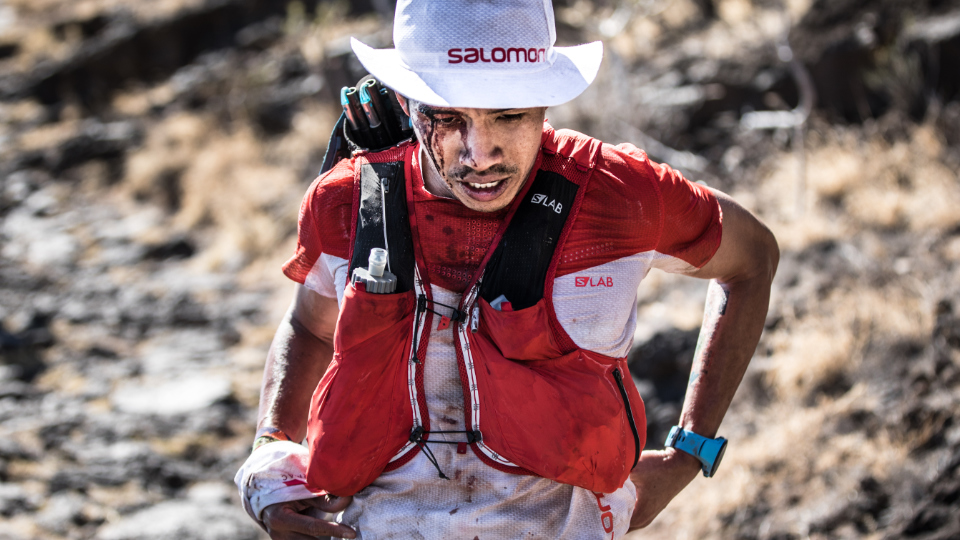
RS: What was your greatest accomplishment as an ultra runner?
Ian: From an athletic achievement standpoint, it would have to be my most recent race at the Lemkowyna Ultra Trail 48km in Poland last month. I achieved my best ever race result since I started trail running, placing in the top 10 overall and finishing 8th male out of 370 runners.
I had never ever imagined that a top 10 finish in any trail race was possible, let alone at a European one, so this result is really special and memorable to me, especially as I was able to celebrate and share the moment with my daughter and wife at the finish, who were there for the first time at one of my races.
From the perspective of the spirit of ultra running, my greatest accomplishment would definitely be completing by first 100 mile race at the Ultra-Trail du Mont Blanc (UTMB) last year, a 170 km loop around Mont Blanc, with 10,000m of climbing. Being out there for almost 38 hours was really challenging, not just physically, but even more so mentally.
At one point, I started hallucinating in my sleep-deprived state, and saw faces in the trees and rocks! It was, and still is, the biggest test I’ve ever faced in running.
What made it so memorable though, is that it was my first 100 mile race, which is a special distance in ultra running, and also the culmination of a five-year journey to ticking this iconic race – the one that first captured my imagination in this sport – off my bucket list.
RS: What are you looking to achieve next in running?
Ian: For next year, I would like to complete another 100-mile race if possible: either Western States 100 or Diagonale des Fous. If I can’t do a 100 miler this year, I would like to take a crack at doing a sub 3:30 marathon at the Berlin marathon.
A huge goal of mine for 2020 is that I would like to continue to build on what has been my most successful season ever this year by taking the leap in distance and having a great race at the 100k distance.
I would also like to do a couple of shorter, faster races (eg. Sierre Zinal) next year to continue to hone that aspect of my racing skills. While the longer ultra-distance races are what truly draw me to the sport, I believe that also doing shorter races will make me a more versatile and complete runner in the long run.
My Race Calendar for 2020 (tentative):
- Paris Eco-Trail 80km (March);
- Zegama-Aizkorri (Golden Trail Series race) OR Eco Trail Geneva (June);
- Western States 100 miler OR Val D´Aran by UTMB/Eiger Ultra Trail (June/July)
- Sierre Zinal (August) (Golden Trail Series race)
- Diagonale des Fous 100 miler OR Berlin Marathon (Sep/Oct)
RS: What you have learned as an ultramarathoner?
Ian: Training for ultra marathons has taught me the value of consistency, commitment and hard work. For instance, being committed enough to motivate myself to get out the door in sub-zero temperatures when it’s dark and raining outside in the middle of winter.
Or being consistent in training and willing to grind through the monotony of training alone day in day out for months on end before a race.
Without those values, it would be really difficult to show up and get the best out of myself on race day. I do think that ultra runners tend to possess certain common personality traits.
Because running is a solitary sport in many ways, you really need a certain level of mental toughness and the grit to push through the inevitable difficult patches, even when there’s no one watching or cheering you on.
Most ultra runners also tend to enjoy, or are at least comfortable, with solitude, which is important to be able to cope with the loneliness of long-distance running.
RS: What tips will you give to someone who wish to try ultra running?
Ian: Don’t get caught up in the hype of rushing to run longer distances for the sake of it. Start off slow and take it step by step, which will allow you to build a solid foundation.
Try a 50km first, let your body get used to the distance, and then progress to a 70-80km race, then a 100km, and so on. Trying to rush into the big mountain races without having built up a sufficiently solid foundation beforehand is a recipe for failure.
You might finish the race, but you probably won’t enjoy too much of it, and your body might suffer from injuries or other long-term damage if it’s not prepared for the demands of taking on these longer distances.
You can follow Ian Lye on Instagram: @ianlye
10. Ultra Runner: Siti Mariam Binti Mostamam
Bio: 29 year-old Malaysian drafter designer
Currently living in Kuala Lumpur, Malaysia, Siti Mariam from Johor works in an oil and gas company. She is the youngest among her 8 siblings. Mariam has started joining sports since 1999. She is an athletic and played netball too.
Proper preparation, discipline, training and above all dedication, all is possible.
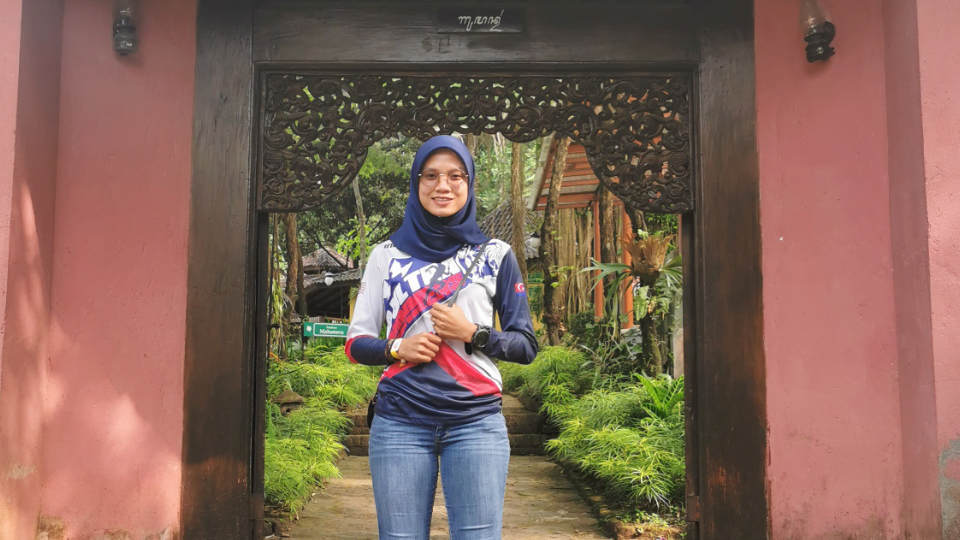
RS: When did you start to run long distance running?
Mariam: I started in June 2018 for Educity Road Challenge 2018 under 55 KM Category and that was my first Ultra Marathon. For Ultra Trail, I started in March 2019 for Gopeng Ultra Trail under 50 KM and it was my first Ultra Trail event.
I also joined Rinjani in Indonesia last 2018, under 27 KM category. I also joined in the Mantra Summit Challenge in Indonesia this year 2019 under the 35 KM category.
Why did you love ultra running?
Mariam: For now, I prefer to run Ultra Trail events and so far, I ran for 55 KM for almost 3 to 4 times before I upgraded to 100 KM Trail Running. I usually run Full Marathons (42.195 KM) to collect mileage, which will prepare me for my Ultra Trail events.
RS: Where do you train for your ultramarathon?
Mariam: Basically, I go to Gunung Pulai, Johor (600M elevation) for three loops and long slow distance (LSD) around the Johor City for normally 21kM.
RS: How do you train for your ultra race?
Mariam: For me, I run at least 50 km under one session (this might include stopover and rest) before running a 100 KM race. It doesn’t matter if it is under an event or personal training. This is for the purpose of testing your limit just for the training itself.
Basically, I will be working out as frequently as possible (core exercises, lower body exercises and so do the upper body exercises) I also do LSD at least once a week and fun run at least 5 KM per day. As for nutrients, I eat carbs (no spicy food) and get enough sleep.
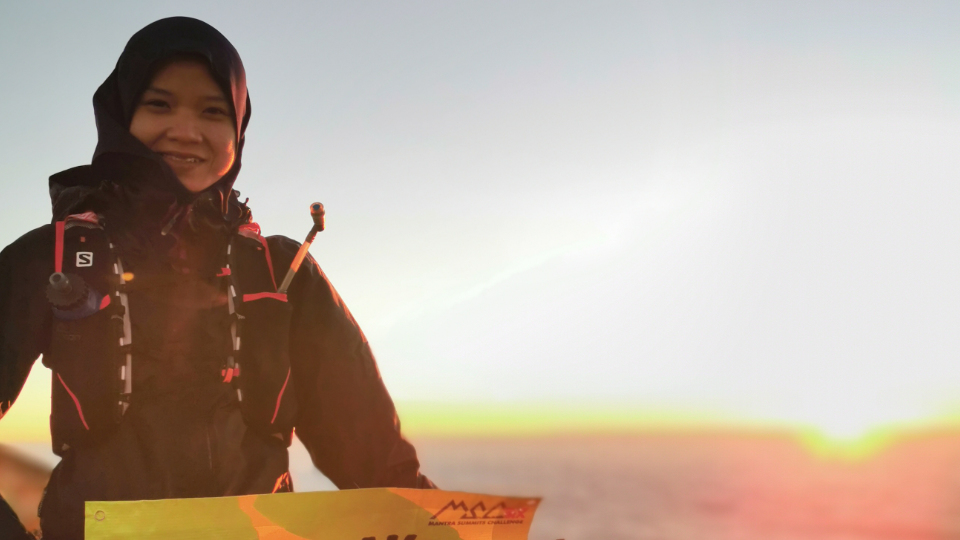
RS: Can you share with us one of your most memorable race and why?
Mariam: Actually, I am still a newbie in Ultra Race. I finished my first Ultra Trail and first Ultra Marathon just before the cut off time wherein those things matters a lot and indeed an accomplishment for me.
As for my experience, the environment in Malaysia and Indonesia are totally different. I ran 27 KM and 30 KM in Indonesia with an elevation of around 3000 meters. For me, those runs were so tough because if you’re not prepared, you’ll end up with AMS (Altitude Mountain Sickness).
The areas were so cold, which is close to 10 degrees and you have to run with Windbreaker and Gloves which is totally different than running in Malaysia. The mountain views in Indonesia were breathtaking and it was indeed an experience to be cherished.
One of the most memorable races I ever had is the TMBT (The Most Beautiful Thing 2017) held in Sabah, Malaysia. I was able to pull it up and made it for Podium No. 3 for 12 KM, however, I am not an Ultra Marathoner yet.
RS: What are your immediate running goals?
Mariam: Next month, I will be joining the UD event to be held in Batu Arang. This event will be sponsored by Key Power Sport, me being a KPS ambassador and my target is to get a better PB (Personal Best).
I am planning to upgrade my level in running from 80 KM – 100 KM (Trail running), and if my training will be enough and so does my body will be fitter, I will be joining Rinjani for 36 KM or perhaps 60 KM in 2020.
RS: What you have learned from running?
Mariam: As we all know, running is one of the best and fun activities to do. A healthy lifestyle is very important and by projecting healthy lifestyle by doing a fun activity, which in my case is running. It is very essential that it makes our life balance better.
By focusing on a specific activity, it’ll make us knowledgeable by observing things (pertaining to that activity) and so as to embrace the knowledge that we’ll be getting along the way and to practice all of those actually is a very fulfilling thing. The challenge in there is consistency.
Consistency alone is composed of dedication and perseverance and Ultra Marathon is a big leap from standard marathon much more if it will be on trails. But by proper preparation, discipline, training and above all dedication, all is possible.
After crossing the finishing line, the pride and joy are immeasurable and so as contentment and satisfaction.
RS: Can you share some tips for someone who wishes to try long distance running?
Mariam: Preparation. Being a responsible runner already requires too much of things and by committing yourself to the demand of it, nothing is impossible.
It might take a while for a person to be ready for an ultra marathon, but just having the intention is already good enough. You just have to equip yourself with proper knowledge about it, prepare for it (training) and be ready for it, all is possible.
You can follow Siti Mariam Binti Mostamam on Instagram: @mariam_mostamam
The road to an ultra marathon
It is said that if you want to experience a different life run a marathon and if you want to talk to God, run an ultra.
Our elite ultra runners have shared with us many amazing running experience that they have encountered and we believe there will be many more great stories when they continue to pursue their running achievements.
Will you ever try running an ultra marathon during your lifetime?
Is long distance running healthy?
There have been debates whether long distance running can be extremely damaging to your health. However, studies show that the risks to ultra marathon runners lie in the races themselves rather than their long-term effects. Long distance running provides an efficient full-body workout, burns a ton of calories, tones the body, and improves emotional well-being.
How many kilometers is an ultra marathon?
An ultra marathon or ultra running is any organised footrace extending beyond the traditional marathon running distance of 42.195 kilometers. Ultra races usually begin at 50 kilometers and can extend to extreme distances.
How long does it take to run an ultramarathon?
Most runners take an average of 10 hours to finish a 50 mile ultra marathon. For 100-milers, the time to complete the race typically take 24 to 30 hours or more of non stop moving.
How long does it take to train for an ultra marathon?
For marathoners, you will need to accumulate an average of 4 to 6 hours of running per week for at least three weeks to prepare yourself for a 50km ultra marathon. For longer distance, such as 100K, you will need at least 9 hours of training per week for 6 weeks. Outside of this 3- or 6-week period, you can have a lower volume as long as you also do higher-quality training.



